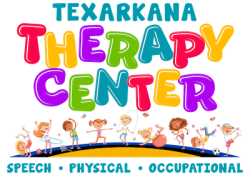In the world of occupational therapy, you will hear a lot of talk about fine motor skills and development. Fine motor skills involve the use of small muscles that control the hand, thumb, and fingers. These small muscles are the foundation for children to be able to perform activities that range from simple self care to complex academic tasks. Fine motor skills are often taken for granted, but it is important to be aware of your child’s fine motor skill development level. Being able to complete activities such as self feeding, buttoning a shirt, or writing your name are all essential to improving a child’s independence, self esteem, confidence, and ability to complete functional tasks across the board.
Posted by:
Texarkana Therapy Center
Article by: Lindsay Meador, COTA
It is important to remember that your therapist will assist in the development of your child’s fine motor skills, but you as parent/s are just as important in your child’s development as you are able to spend the most time carrying over activities and programs at home that will promote fine motor growth and development in your child! The most important thing you can do is to provide opportunities that are fun and interactive! It is important to start working with your child early on. As your little one moves through childhood, their fine motor skills will continue to develop and improve, but it just takes the right kind of practice! Development of fine motor skills in early childhood, helps build the foundation for important future skills like writing and self-care as mentioned above.


Your child’s fine motor skills will gradually build as they engage in activities that promote their fine motor strength and coordination. For example, it requires strength, endurance, and bilateral coordination to cut along a line or around a shape with precision movements. As a child’s hands and fingers become fatigued this will directly affect their ability to maintain appropriate grasp, provide stability, and execute tasks with precision movements. To assist with this, be sure to keep fine motor activities fun and change it up for your child! The more your child wants to play and explore with activities that build their fine motor skills, the more precise their movements will be!
Listed below are a variety of activities that can help with your child’s fine motor skill development! Some activities may overlap which is always a bonus!
Strengthening Activities
• Play Dough/Theraputty
• Stirring batter or dough
• Squeeze, roll, and play with resistive materials
• Climbing up ladder or playground equipment that promotes grip strength
• Buckles and snaps
• Crafts
• Cutting
• Putting together and taking apart resisitive or interlocking toys such as leggos or pop beads
• Clothespin activities
• Lacing card activities
• Nut and Bolts

Academic Activities

•Coloring/Drawing
• Cutting
• Tracing
• Writing
• Play Dough Activities
• Sorting Pom Poms/ Objects with Play Tweezers
• Activities with Snap Cubes
Self-Care Activities
• Buttoning
• Zipping
• Snaps
• Tying shoes
• Brushing teeth and hair
• Toileting tasks
• Eating/cutting food

Free-Play Activities

• Building with leggos and blocks
• Puzzles
• Play Dough creations
• Drawing with sidewalk chalk
• Beading bracelets or necklaces
• Games that promote grasp development such as Operation or Lite Brite
• Dressing up dolls or toys
Try our Free Online Screening Tool
If you are not in therapy and you are wondering if your child may be falling behind with milestones such as fine motor, gross motor, speech or sensory processing, please try our online screening tool. You will be given a survey of age-appropriate milestones for speech, language, gross motor skills, fine motor skills and sensory processing for children ages 1-6.
Previous Story
No story to show!
Next Story


